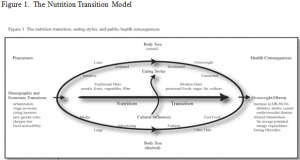Katherine Craven and Dr. Steven Hawks, Health Science
The impact of economic development on nutrition and dietary changes in transitional countries has been well researched. It has generally been found that there is a positive correlation between economic development and negative nutritional transitions. As a country becomes economically wealthier, its population tends to exhibit unhealthy eating and dieting behaviors. Populations with little history of obesity and diet-related non-communicable diseases begin to show increased occurrence of such problems, demonstrating a progression within the nutrition transition model (figure 1). However, the impact of western influences and culture on the nutrition transition has been less studied.
There is limited information about cultural and western influences in Thailand. Recent findings show that Thailand has progressed farther along the nutrition transition model than would be expected based solely on economic development. In order to understand Thailand’s unpredicted advancement within the nutrition transition model, it is necessary to further explore eating styles and eating motivations among the Thai people. The purpose of this study was to determine current prevailing motivations for eating and to identify eating styles. It was hypothesized that despite the lower level of economic development when compared to the US, Thailand would demonstrate high levels of extrinsic eating and dieting behavior. Extrinsic eating is characterized by food consumption motivated by factors other than the physical satisfaction of hunger. These factors include eating for emotional satisfaction, environmental influences, and social influences. Dieting behavior is defined as restricting food intake to control weight gain. Confirmation of the hypothesis would support the need for educational programs in Thailand that might help prevent the unhealthy progression of a nutrition transition based on negative western influences.
I traveled to Thailand to administer four pencil and paper questionnaires to 662 students at four Thai universities. The questionnaires were used to assess eating and dieting attitudes of the subjects. College students were chosen as they are most susceptible to the nutrition transition because they reside in urban centers and are exposed to western media influences and current eating fads and fashions. They are also more likely to experiment with food and image fashions in order to enhance their personal image or experience cross-cultural impulses. Although Thai students may not be representative of the Thai people as a whole, they are representative of the rising generation and of emerging and prevailing trends in fashion and lifestyle.
Data collected from the four questionnaires and analyzed using SPSS Graduate Pack 12.0 for Windows confirmed the hypothesis. Although Thai students demonstrated a lower occurrence of eating disorders than their western counterparts, they exhibited a higher occurrence of dieting and restrictive eating (restricting food intake to control weight). The data showed that dieting behavior correlated with emotional and social eating, as well as higher Body-Mass Index (BMI). These results are concerning because it shows the progression within the nutrition transition model toward disordered eating behavior. The incidence of eating disorders among Thai students, although comparatively low, was also strongly correlated with dieting behavior and a high BMI. The results of this study indicate that Thai students in general should be discouraged from participating in dieting behavior as it is associated with eating disordered attitudes and an increase in BMI.
The progression toward dieting behavior and disordered eating is not unique to Thailand. There is a global preference for a thin, lean figure which motivates the adoption of dieting behavior and propels progression within the nutrition transition model toward disordered eating. As in Thailand, this negative progression may be prevented by the implementation of educational programs to introduce healthy eating styles to the affected population.
Although the results of this project are alarming in that it shows the unexpected progression of Thai students toward unhealthy eating behaviors, they also offer a degree of hope. With the successful implementation of educational programs the trend can be prevented. It is possible that even with Thailand’s successful economic development the Thai population need never experience the negative nutritional consequences such as obesity, eating disorders, diet-related non-communicable diseases that the western world has experienced. This health and economic burden can be avoided.
This project was a delight to work on. The Thai people are so accommodating and friendly. It was a joy to become more acquainted with their culture, their language, and their country. The logistics of the project provided endless learning opportunities. Translating the questionnaires from English into Thai required the work of four individuals and several revisions. I spent several hours improving my Thai vocabulary, my knowledge of statistics, and my understanding of research literature. I could never have completed this project without the constant help and guidance of my mentor, Dr. Steve Hawks.

